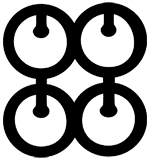The Doors of Perception
Aldous Huxley is the author of one of my favorite novels (Brave New World), but his work as a non-fiction writer was extremely impressive. “The Doors of Perception” documents his experiences with mescaline. He was fascinated with states of consciousness and with the revelations that different states of consciousness enabled. Mescaline was particularly interesting to him because, “administered in suitable doses, it changes the quality of consciousness more profoundly and yet is less toxic than any other substance in the pharmacologist’s repertory.” Huxley described the effects in more detail:
What happens to the majority of the few who have taken mescaline under supervision can be summarized as follows. (1) The ability to remember and to “think straight” is little if at all reduced. (Listening to the recordings of my conversation under the influence of the drug, I cannot discover that I was then any stupider than I am at ordinary times.) (2) Visual impressions are greatly intensified and the eye recovers some of the perceptual innocence of childhood, when the sensum was not immediately and automatically subordinated to the concept. Interest in space is diminished and interest in time falls almost to zero. (3) Though the intellect remains unimpaired and though perception is enormously improved, the will suffers a profound change for the worse. The mescalin taker sees no reason for doing anything in particular and finds most of the causes for which, at ordinary times, he was prepared to act and suffer, profoundly uninteresting. He can’t be bothered with them, for the good reason that he has better things to think about. (4) These better things may be experienced (as I experienced them) “out there,” or “in here,” or in both worlds, the inner and the outer, simultaneously or successively. That they are better seems to be self-evident to all mescalin takers who come to the drug with a sound liver and an untroubled mind.
Right now, I am in the early stages of my effort to experience altered states of consciousness. It’ll likely take years of meditation to get there. This is frustrating, but it will be worth it. Reading about the experiences of adept meditators, mystics and drug users is one thing, but the experience itself is bound to be infinitely more impactful. As Huxley said, simply reading about these experiences is similar to reading an “elegantly composed recipe in lieu of actual dinner.”
Drugs are, of course, the easy way out. As Huxley pointed out, “we now spend a good deal more on drink and smoke than we spend on education. This, of course, is not surprising. The urge to escape from selfhood and the environment is in almost everyone almost all the time… the need for frequent chemical vacations from intolerable selfhood and repulsive surroundings will undoubtedly remain.” I think that instead disciplined meditation is the way to escape the evils of selfhood.
I am not going to take mescaline (not could I, don’t know anyone with a mescaline hookup), but Huxley was one hell of a salesman in this book:
To be shaken out of the ruts of ordinary perception, to be shown for a few timeless hours the outer and the inner world, not as they appear to an animal obsessed with survival or to a human being obsessed with words and notions, but as they are apprehended, directly and unconditionally, by Mind at Large—this is an experience of inestimable value to everyone … But the man who comes back through the Door in the Wall will never be quite the same as the man who went out. He will be wiser but less cocksure, happier but less self-satisfied, humbler in acknowledging his ignorance yet better equipped to understand the relationship of words to things, of systematic reasoning to the unfathomable Mystery which it tries, forever vainly, to comprehend.
